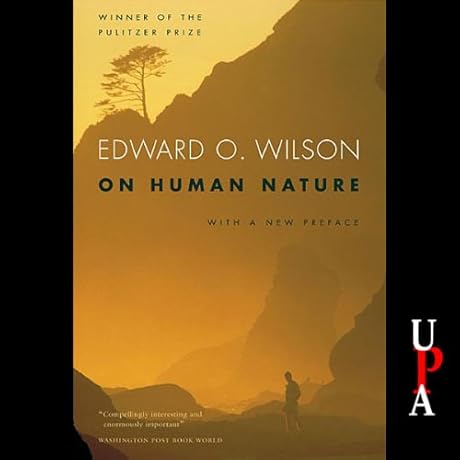· biology · 13 min read
On Human Nature: Revised and Expanded Edition
Explore the captivating and thought-provoking book, "On Human Nature" by Edward O. Wilson. A renowned work that will spark your curiosity about human behavior, nature, and our place in the universe.
In "On Human Nature," acclaimed scientist Edward O. Wilson delves into the intricate depths of what it means to be human. With a profound understanding of biological sciences, he unravels the profound evolutionary forces that have shaped our thoughts, emotions, and social structures, providing a captivating exploration of the human condition.
Overview

PROS
- Provides a comprehensive analysis of human behavior from a biological perspective.
- Discusses the latest scientific research on human evolution, genetics, and behavior.
CONS
- Can be challenging for readers without a background in biology.
- Some arguments may be controversial or subject to debate.
In his groundbreaking work, 'On Human Nature: Revised Edition,' Edward O. Wilson explores the biological basis of human behavior. Drawing upon the latest scientific research in evolution, genetics, and behavior, Wilson argues that human nature is shaped by both our biological instincts and our cultural experiences.
Wilson's analysis is both comprehensive and provocative. He examines everything from the origins of altruism to the evolution of language, from the role of aggression in human society to the impact of culture on human behavior. While some of Wilson's arguments may be controversial, there is no doubt that 'On Human Nature' is a tour de force that has had a profound impact on our understanding of ourselves.

PROS
- In-depth analysis of Wilson's key concepts, including genetics, evolution, and altruism.
- Clear and concise summaries of each chapter, providing quick access to essential information.
CONS
- May not provide enough depth for advanced readers who seek a comprehensive understanding.
- Lacks interactive elements or practice questions for self-assessment.
Delve into the complexities of human nature with 'SuperSummary's Study Guide for 'On Human Nature' by Edward O. Wilson.' This study guide offers a comprehensive exploration of Wilson's groundbreaking work, empowering you to grasp the fundamental principles that shape our understanding of ourselves and our place in the natural world.
Through in-depth analysis and clear summaries, this guide illuminates Wilson's key concepts, tracing the intricate relationship between genetics, evolution, and altruism. Each chapter is meticulously dissected, providing a thorough understanding of Wilson's arguments and supporting evidence. Whether you're a student looking to ace your exams or an avid reader seeking deeper insights, this study guide will serve as an indispensable resource.

PROS
- Provides a comprehensive perspective on human nature, drawing insights from various scientific and social sciences.
- Thought-provoking and well-argued examination of the relationship between science and the humanities.
CONS
- May be challenging for readers unfamiliar with scientific concepts and terminology.
- Some readers may find the scope of the book to be overwhelming.
Edward O. Wilson's 'Consilience' presents a compelling vision of unity across disciplines, particularly in relation to human nature. Wilson's interdisciplinary approach draws upon biology, anthropology, history, and philosophy to provide a holistic understanding of human behavior. By highlighting the interconnectedness of science and the humanities, Consilience emphasizes the importance of considering multiple perspectives in the study of human nature.
Consilience invites readers to consider the implications of scientific knowledge for understanding human behavior, ethics, and even spirituality. Wilson argues that science can provide insights into human nature that complement and enrich the perspectives offered by the humanities. As such, he encourages a dialogue between these fields to deepen our understanding of ourselves and our place in the world. However, this comprehensive approach may pose challenges for readers unfamiliar with scientific concepts. Nevertheless, Wilson's thought-provoking arguments and well-researched evidence make Consilience a valuable contribution to the study of human nature and interdisciplinary knowledge.

PROS
- Captivating exploration of human evolution and the rise of complex societies
- Compelling insights into the biological and cultural factors that shaped our past
CONS
- Some topics may be dense and challenging for casual readers
- Certain arguments could benefit from more empirical evidence
In his groundbreaking work, 'The Social Conquest of Earth', the renowned biologist Edward O. Wilson presents a captivating exploration of human evolution and the emergence of complex societies. Drawing upon a vast array of scientific disciplines, Wilson deftly weaves together biological, anthropological, and historical evidence to paint a comprehensive picture of the forces that have shaped our species.
Wilson argues that human evolution has been driven not solely by natural selection, but also by cultural innovations. Through the development of language, tools, and social cooperation, humans have been able to adapt to diverse environments and establish thriving societies. Wilson meticulously examines the evolutionary origins of warfare, religion, and art, providing profound insights into the complexities of human nature.

PROS
- Comprehensive exploration of human nature, delving into topics such as genetics, culture, and society.
- Thought-provoking insights from renowned biologist and naturalist Edward O. Wilson.
- Engaging writing style that captivates readers from start to finish.
- Well-researched and thorough, providing a solid foundation for understanding human behavior.
- Provocative and challenges conventional wisdom, encouraging readers to think critically.
CONS
- Can be somewhat dense and technical for readers without a scientific background.
- Might present a controversial or unexpected perspective on human nature.
On Human Nature by Edward O. Wilson is a profound exploration into the intricate tapestry of human existence. Rooted in scientific evidence and interweaving diverse disciplines, Wilson masterfully unveils the complexities of our origins, behaviors, and societal structures. This thought-provoking work challenges long-held beliefs and invites readers on a journey of self-discovery.
Wilson's elegant prose and comprehensive research create a compelling narrative that effortlessly transports readers through the corridors of human nature. From the depths of our genetic makeup to the intricacies of social interactions, he unravels the fundamental aspects that shape our experiences and define our humanity. Whether you're a seasoned student of human behavior or simply seeking a deeper understanding of yourself, On Human Nature offers a transformative glimpse into the meaning and complexities of our existence.

PROS
- Time-saving due to effective step-by-step guide.
- Develops research skills systematically.
CONS
- The guidebook may not consider all areas of study in depth.
This guidebook was time-saving for me because it provided a step-by-step approach in completing my dissertation. I like how the author breaks down the complex concept of thesis writing into smaller more manageable methods. I would recommend this to any student doing quantitative research for their first time.
This book helped me tremendously, and I highly recommend it to anyone who needs a comprehensive guide to writing a thesis or dissertation.

PROS
- In-depth exploration of the intricate diversity of life on Earth.
- Illuminating insights into the evolutionary forces that have shaped our planet's extraordinary array of species.
CONS
- Complexity of the scientific concepts may challenge some readers.
- Limited practical applications for the general audience.
Embark on a captivating journey into the heart of life's mesmerizing diversity with Edward O. Wilson's 'Every Species is a Masterpiece.' This comprehensive tome unravels the intricate tapestry of the natural world, delving into the awe-inspiring variety of species that grace our planet. Through a masterful synthesis of scientific research and personal anecdotes, Wilson unveils the evolutionary forces that have orchestrated life's grand symphony.
Wilson's keen eye for detail and profound understanding of ecology shine throughout this work. He paints vivid portraits of diverse ecosystems, from the vibrant rainforests to the desolate deserts, showcasing the remarkable adaptations that allow life to flourish in even the most challenging environments. With each turn of the page, readers gain a deeper appreciation for the inherent beauty and interconnectedness of all living organisms.

PROS
- Unveils the fascinating life and scientific contributions of E. O. Wilson.
- Provides an in-depth exploration of Wilson's pioneering work in sociobiology and biodiversity conservation.
CONS
- Some readers may find the scientific terminology challenging to grasp.
- The book's focus is primarily on Wilson's professional life, with limited personal details.
Delve into the remarkable journey of Edward O. Wilson, a pioneering scientist renowned as the father of sociobiology. Scientist: E. O. Wilson: A Life in Nature chronicles his extraordinary life, shedding light on the groundbreaking contributions he made to our understanding of human nature and the intricate web of life on Earth.
Through a captivating narrative, this book explores Wilson's formative years, his revolutionary research on ant colonies, and his unwavering dedication to protecting biodiversity. By interweaving personal anecdotes and scientific insights, the author paints a vivid portrait of a visionary who dared to challenge conventional wisdom and redefine our comprehension of the natural world. Scientist: E. O. Wilson: A Life in Nature is an essential read for anyone fascinated by the intricate tapestry of life and the human psyche.

PROS
- Delves into the captivating depths of human origins and the interplay between biology and culture
- Masterfully synthesizes diverse fields of study, providing a comprehensive account of societal evolution
CONS
- Its extensive coverage may be overwhelming for casual readers
- Certain sections may require prior knowledge of evolutionary biology and anthropology
In his groundbreaking work, 'Genesis: The Deep Origin of Societies,' E. O. Wilson embarks on an intellectual voyage that unravels the intricate tapestry of human nature and societal evolution. Drawing upon a vast array of disciplines, from biology and anthropology to psychology and history, Wilson paints a compelling portrait of our species. He interweaves personal anecdotes and scientific insights to shed light on the fundamental forces that have shaped our societies and continue to influence our behavior.
Wilson's exploration начинается with the dawn of humanity, delving into the genetic and environmental factors that laid the foundation for our unique characteristics. He traces the intricate paths by which humans have adapted to diverse environments, forming complex social structures and cultural traditions. Along the way, Wilson challenges conventional notions of human nature, arguing that our innate drives and capacities are deeply intertwined with our evolutionary heritage. 'Genesis' serves as a profound reminder of the interconnectedness of all living beings and the intricate web of factors that have shaped our existence.

PROS
- Explores the profound relationship between human beings and technology, offering insights on its influence on our nature and development.
- Provides a comprehensive overview of technology's genesis and progression, examining its diverse applications and implications.
CONS
- Some readers may find the philosophical and sociological perspectives challenging to grasp.
- The book primarily focuses on the macro-level analysis of technology's impact, with limited exploration of individual-level experiences.
Edward O. Wilson's 'The Nature of Technology' takes us on an intellectual voyage to explore the intricate connection between humanity and technology. Wilson presents a compelling narrative that delves into the origins of technology and its profound influence on our species. He deftly weaves together historical insights, scientific discoveries, and anthropological perspectives to craft a comprehensive analysis of technology's role in shaping human nature.
The book's strength lies in its ability to provide a broad understanding of the subject. Wilson examines the evolution of technology from its humble beginnings to its current state of pervasive integration into our lives. He highlights the advancements that have propelled human progress, while also acknowledging the potential risks and ethical challenges that accompany these innovations. By drawing upon diverse fields of study, Wilson offers a nuanced understanding of technology's impact on our societies, culture, and individual experiences.
Through "On Human Nature," Wilson delves into the interplay between our biological instincts and the cultural norms that shape our societies, masterfully revealing the profound influence of our evolutionary history on every aspect of our lives. He challenges long-held beliefs and provides fresh perspectives on topics such as ethics, morality, and the pursuit of knowledge, urging us to embrace a holistic understanding of ourselves and our place in the natural world.
Frequently Asked Questions
What are the key ideas explored in "On Human Nature"?
In "On Human Nature," Edward O. Wilson explores the intricate relationship between our biological makeup and our cultural and social behavior, arguing that our innate instincts and evolutionary history play a significant role in shaping human nature.
Why is Edward O. Wilson's work so highly regarded?
Edward O. Wilson's work is widely recognized for its groundbreaking contributions to the fields of biology, sociobiology, and evolutionary psychology. His research and writings have reshaped our understanding of human behavior and our place in the natural world.
What are some of the most thought-provoking insights in "On Human Nature"?
"On Human Nature" challenges conventional notions about human nature and offers a new perspective on our origins, motivations, and the nature of our existence. Wilson argues that we cannot fully understand ourselves without considering both our biological and cultural heritage.
How does "On Human Nature" connect evolutionary biology to human behavior?
Wilson masterfully weaves together concepts from evolutionary biology, anthropology, and psychology in "On Human Nature." He argues that our evolutionary history has left an imprint on our behavior, shaping our social interactions, moral values, and even our pursuit of knowledge.
What is the significance of "On Human Nature" for understanding ourselves and the world around us?
"On Human Nature" offers a profound exploration of the human condition, providing valuable insights into our origins, our place in the natural world, and the challenges and opportunities that lie ahead for humanity.













